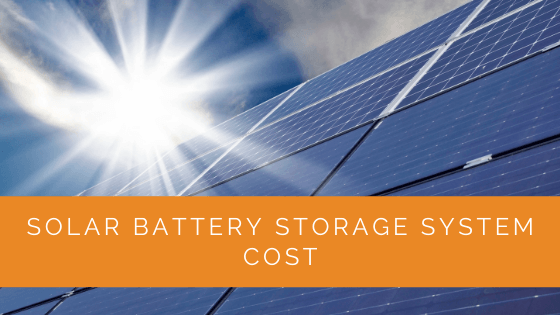Solar panels make for an excellent source of cost-effective energy suppliers. You may have an existing solar PV system or plan to get a new one to enjoy reduced electricity bills. Still, what about energy usage in the absence of sunlight?
That’s where solar energy systems, a.k.a solar batteries, step in, and so does the question of solar battery storage system cost.
Solar batteries help you stock up on solar energy even when the sun is not shining bright. Also known as hybrid solar systems, such a setup lets you cut down on your annual energy bills and reduce your carbon footprint. Sounds interesting, right?
Before you upheave your solar panel system, you must weigh multiple factors that impact the battery system costs. These include the size of your current solar system, required battery storage, average energy consumption, and more. Besides, you cannot ignore the installation costs and maintenance charges.
This blog has you covered solar battery storage system prices based on multiple aspects. Dive in!
Contents
- 1 Key Takeaways
- 2 What is A Solar Battery Storage System?
- 3 How Do Solar Batteries Work?
- 4 How Much Does A Solar Battery Storage System in the UK Cost?
- 5 Solar Battery Repair and Installation Cost
- 6 Factors Affecting A Solar Battery Cost
- 7 Are Solar Batteries Worth It: Pros and Cons of Solar Battery Storage Systems
- 8 Shortcomings of Solar Battery Storage
- 9 How to Pick the Right Solar Battery Storage System?
- 10 FAQs
- 11 Case Study: Integrating Solar Battery Storage in a Residential Setting
- 12 Expert Insights From Our Solar Panel Installers About Solar Battery Storage Systems
- 13 Discover the Power of Solar with Solar Panels Network
- 14 Wrap Up
Key Takeaways
- Solar batteries, also known as solar energy storage systems, allow you to store solar energy when the sun is not shining, helping reduce energy bills and carbon footprint.
- The cost of a solar battery storage system in the UK varies widely, ranging from £500 to over £15,000, depending on factors such as capacity, battery type, and installation costs.
- Factors affecting solar battery cost include battery type (e.g., lithium-ion or lead-acid), AC or DC system, lifespan, material, and capacity, with longer lifespans and higher capacities generally leading to higher costs.
What is A Solar Battery Storage System?
A solar battery storage system is a kind of energy storage that you can use with your solar panels to store solar energy. The setup includes an inverter and solar battery. When the solar panels get plenty of sunlight, they can charge the solar batteries during the daytime.
You can then use these to power up your lights, fans, and other electronic devices, even at night. However, these batteries are different, including gel, absorbed glass mat, and lead-acid batteries. The storage devices differ in function, performance, and cost-efficiency.
How Do Solar Batteries Work?
When solar panels receive sunlight during the day, the solar cells undergo chemical processes, producing direct current (DC) electricity.
The DC electricity passes through the grid, and the attached inverter converts it into AC electricity. This energy then powers your home’s main electrical panel. However, the process does not end there.
When the sun is bright enough, our solar panels generate more energy than you may need. That’s where solar battery storage systems enter. The energy storage system traps the excess renewable electricity for later use. That is, the solar panels charge up your solar batteries.
Once fully charged, you can use them to power your electronic devices at any time during the day or night. The solar battery storage systems have your back, especially if you are in situations like a power cut.

How Much Does A Solar Battery Storage System in the UK Cost?
A solar battery generally ranges between £500 to £10,000 or more in the UK, depending upon factors like capacity, life cycle, and composition. For example, a battery of 1 kWh may cost around £400-£500. Additionally, you may need to purchase an inverter for about £1000.
You must note that this price differs from a solar battery storage system. The latter is a complete energy storage system with a battery and an inverter to transfer energy. The price of a complete solar battery system starts from £900 and goes beyond £15,000.
To buy a solar battery, you must look for an inverter separately, costing around £300 to £800 or more. However, that’s not the only point to consider. You will need to consider other factors like repair and installation costs.
Solar Battery Repair and Installation Cost
When considering energy storage system installation costs, you must consider the area’s labour costs. On average, the labour costs of installing a solar battery storage system range from £300-£500 per person per day. So if you employ two individuals, it will cost about £600-£1000.
That said, multiple factors affect the costs of installing a solar battery.
Size of the Solar Panels
Adding solar batteries and inverters to many existing solar PV systems will automatically cost you more.
Installation Process of the Battery Systems
While you may think of installing a solar battery storage system yourself, it is not always the best idea. A professional will know how to set up the devices such that they work efficiently.
Location Costs
While the average labour cost is £300-£500 per person per day, it also depends on your area’s current rates.
Factors Affecting A Solar Battery Cost
Now that you know the installation cost of energy storage systems, let’s move on to the solar batteries cost. The type, material, lifespan, storage, and usable capacity of the solar batteries installed significantly impact the solar battery cost.
Types of Solar Batteries
While the most common solar batteries for homes are lead-acid and lithium-ion batteries, both of them have varying qualities and prices:
Lithium-Ion
These batteries are compact yet energy-dense. That means lithium-ion batteries can hold more energy despite being small. Besides, they are easy to maintain, have a good lifespan, and have a warranty of about ten years. Additionally, its high depth of discharge lets you use the maximum energy stored in the solar battery.
Cost: £1000/kWh (approx.)

Lead Acid
Having been in use for around two centuries, lead-acid batteries are well-tried and tested. These are the cheapest solar batteries you can give for recycling after use. Thus, they help reduce your energy bills while being environmentally friendly.
Cost:£500 (approx.)
AC or DC System
Alternating Current (AC) and Direct Current (DC) systems indicate how the solar batteries connect to the solar panels.
AC
You cannot connect an AC battery directly to a solar PV system as it requires an electricity meter. However, this is the best home battery storage system for existing solar panels. That is because it is easier to retrofit. It would be best to have an inverter to complete this storage system.
So, how does an AC solar battery work? The inverter receives DC from the solar PV system and converts it into AC. Only then does your home’s primary electricity panel receive energy to power the different devices?
The battery then captures all the spare AC electricity your home panel is not using. It converts the current into DC to store energy in the battery for later.
DC
You can directly connect a DC battery to a renewable energy source like solar PV panels, as it does not require an inverter. Such batteries can receive DC electricity and transfer it to the main electrical panel, ensuring efficiency.
You must note that a DC solar battery storage system is not the best option for existing solar PV systems. That is because some DC batteries may not be compatible with your solar panels.
Therefore, such a battery is relatively more suitable for new solar panels.
Lifespan
The life cycle of solar batteries affects energy costs significantly. When you install solar panels, you can expect them to work for about 25 years in most cases. However, batteries usually have a shorter lifespan of about 5 to 15 years. Therefore, you will most certainly need to replace your solar panel battery storage in the future.
The longer the lifespan of a solar battery, the more cost-effective it is. Most lithium-ion batteries last double the period of lead-acid batteries.
Material
The battery material and composition affect the discharge rate of solar batteries. That is the rate of discharging the energy storage. While lithium-ion batteries can discharge the majority of the battery storage – 70-90%, lead-acid batteries discharge only up to 50%.
You must note that the better performance of these batteries also means higher costs.
Capacity
When it comes to batteries, there are two types of capacities you must be aware of – storage and usable capacity. The former refers to the total energy storage possible in a solar battery, whereas the latter refers to the amount of stored energy you can use.
You can measure both the types – usable and storage capacity in kilowatt-hours. Note that these measures significantly impact the solar panel battery storage cost. High-capacity solar battery costs will automatically be higher.
Are Solar Batteries Worth It: Pros and Cons of Solar Battery Storage Systems
So, are solar battery storage systems worth it? If you live in an area that receives enough renewable energy that you have surplus electricity, battery storage systems are worth it. Additionally, it is even better for individuals with battery incentives in their areas.
With advantages come shortcomings, so you must consider both before investing in a solar home battery storage system.

Solar Battery Backup Power Supply
If your area experiences a power cut frequently, stored solar power can come to your rescue. Solar batteries can trap the excess energy generated by solar panels during the peak hours of the day so that you can use your electricity at night. With this, you need not depend on the grid system.
Energy Bills Saving
Electricity prices in the UK have been rising steadily. This has resulted in high energy bills for many people. However, there is a solution to this problem. Investing in a home battery storage system can save money on your electricity bills.
Reduced Carbon Footprint
If you, too, wish to lead a sustainable life, enhancing your solar system is an excellent option. Adding the best solar batteries to your solar panels can help reduce your grid electricity consumption and, thus, reduce your footprint.
Save Money
So, are you saving money with a solar battery storage system? Yes, solar batteries store ample energy for later. For example, a 9-10 kWh battery can help you utilize about 30% more solar energy from the solar panels. It can lead to annual savings of £560 on your bills.
Shortcomings of Solar Battery Storage
The main downside of solar energy storage systems is their cost. A solar battery will easily range between £500 to £10,000. Besides, the installation cost can be anywhere above £500-£1000.
You will also have to replace the batteries after about ten years, as that is the average lifespan of solar batteries.
Solution: The good news is you can save money by utilizing government grants such as the Smart Export Guarantee (SEG). If you direct the excess electricity to the national grid, you can earn money and compensate for the energy storage system’s cost. It’s a win-win situation!
How to Pick the Right Solar Battery Storage System?
Considering the multitude of solar companies present in the market, choosing the right type of solar battery can be confusing. You must check out factors like power rating, size, and battery lifespan against your requirements.
Solar Power Requirement Criteria
Before diving into the different aspects, refer to the various points of criteria to gauge your energy needs:
- Large power requirements – high power rating
- Energy-intensive devices – high instantaneous power rating
- Prolonged battery operation – high usable capacity
- Maximum electricity consumption – high-efficiency rating
- Less space and more energy storage – lithium-ion batteries
- Longest lifespan – lithium iron phosphate batteries
Now that you know what you need to look for, check out what each factor means.
Power Rating
Different appliances use varying ranges of power, and this measure helps you gauge the total amount of energy the battery can provide in one hour.
Power rating is calculated in terms of kilowatts (kW). However, you must note that most solar batteries have two types of power ratings – continuous and instantaneous.
The latter type provides large amounts of energy in a short span. You can use them to fire devices requiring high energy to start but can run at a lower power.
Battery Size (Usable and Storage Capacity)
The battery size or capacity refers to the amount of energy a solar battery can store (storage capacity) and supply (usable capacity). Battery size is measured in terms of a kilowatt-hour (kWh).
Lifespan
You can gauge a battery’s lifespan by considering its lifecycles – the number of times you can charge and discharge a battery. For example, a battery with a warranty of 4000 cycles will last for about 11 years (365 x 11 = 4015 days).
Safety
Ensure the solar batteries you purchase meet local and national safety requirements. Additionally, look for Microgeneration Certification Scheme (MCS) installers for secure and professional installation.
Chemical Composition
The chemical composition of solar batteries refers to the primary compound present in them. The material can significantly affect a battery’s storage, usability, and functionality. For example, lithium-ion batteries have a relatively high capacity than others due to their chemical composition.

FAQs
How Much Energy Can You Store in A Solar Battery?
The storage capacity of batteries depends upon their size, and you can measure it in terms of kWh. For example, you can use a 2kWh battery to generate 2000 watts of power for 1 hour. That means it can run about 40 LED bulbs of 5 watts each for 9 hours or a fridge of about 200 for 8-10 hours.
What Is the Lifespan of A Solar Battery?
The average lifespan of a solar battery is around 5 to 15 years. However, it largely depends on the type of battery you choose. A lithium-ion battery will last relatively longer than a lead-acid battery.
Can You Add Solar Batteries to An Existing Solar Panel System?
You can add solar batteries to existing panels, given they are AC (alternative current) batteries. These devices require an electricity meter to receive DC from solar panels and an inverter to convert the current into DC before transmitting it to the home panel.
Note that you cannot add DC batteries to an existing panel as it may not be compatible with the solar panels.
Why Do You Need Solar Battery Systems?
Solar battery systems capture the excess solar energy your solar panels may produce during the day. You may not require much electricity during the day so some energy may be wasted. Solar batteries store this energy so you can use it later at night or during a power cut.
Case Study: Integrating Solar Battery Storage in a Residential Setting
Background
A family residing in suburban London sought a solution to enhance the efficiency and reliability of their existing solar PV system. With frequent power outages in their area and a desire to reduce reliance on the grid, they decided to invest in a solar battery storage system. The goal was to store excess solar energy generated during the day for use at night and during power cuts.
Project Overview
The project involved assessing the family’s energy consumption patterns and determining the appropriate battery storage capacity. The key objectives were to ensure energy independence, reduce electricity bills, and provide a backup power source during outages. Given the variety of solar batteries available, we recommended a solution that balanced cost, capacity, and lifespan.
Implementation
- Assessment and Planning: We conducted a thorough analysis of the family’s daily energy usage and peak power requirements. Based on this data, we recommended a lithium-ion battery system with a total capacity of 10 kWh.
- System Selection: The chosen system included a high-capacity lithium-ion battery known for its efficiency and longevity. We selected this type due to its superior depth of discharge, which allows more of the stored energy to be used compared to lead-acid batteries.
- Installation: The installation process was carried out by certified professionals, ensuring that all safety standards and regulations were met. The battery was integrated with the existing solar PV system, and a smart inverter was installed to manage the conversion and storage of energy.
- Monitoring and Optimisation: A monitoring system was set up to track energy production and consumption. This system helps the family understand their energy usage patterns and optimise their consumption to maximise savings.
Results
- Energy Independence: The solar battery system has significantly reduced the family’s reliance on the grid. During power outages, the battery provides a reliable backup, ensuring that essential appliances and devices remain operational.
- Cost Savings: The family has seen a noticeable reduction in their electricity bills. The system’s ability to store and use excess solar energy has minimised their need to purchase electricity from the grid, particularly during peak hours.
- Environmental Impact: The integration of the solar battery system has further reduced the family’s carbon footprint. By utilising stored solar energy, they are contributing to a decrease in overall fossil fuel consumption.
- Scalability and Future Proofing: The system was designed with scalability in mind, allowing for additional batteries to be added if energy needs increase. This future-proof approach ensures that the system can adapt to changes in energy consumption.
Summary
The installation of a solar battery storage system has transformed the energy landscape for our client, offering both economic and environmental benefits. This case study demonstrates how tailored solutions can meet specific energy needs while promoting sustainability. At Solar Panels Network, we are committed to providing innovative energy solutions that empower our clients and contribute to a greener future. This project highlights our expertise in integrating advanced solar technologies into everyday living, ensuring long-term satisfaction and efficiency.
Expert Insights From Our Solar Panel Installers About Solar Battery Storage Systems
Solar battery storage systems are an essential component for those looking to maximize the efficiency of their solar PV systems. They allow homeowners to store excess energy generated during the day and use it at night or during power outages. This not only ensures a steady power supply but also helps in reducing energy costs.
Senior Solar Installer
Choosing the right type of battery, such as lithium-ion or lead-acid, is crucial as it affects both the cost and performance of the system. Lithium-ion batteries, for instance, offer a higher energy density and longer lifespan, making them a preferred choice despite their higher initial cost.
Renewable Energy Consultant
The installation and maintenance of solar battery systems can be complex, requiring professional expertise to ensure optimal performance and safety. It’s important to work with certified installers who understand the nuances of integrating these systems with existing solar arrays.
Lead Solar Technician
Discover the Power of Solar with Solar Panels Network
Are you navigating the world of solar installations? Look no further than Solar Panels Network, the UK’s trusted partner in harnessing the sun’s potential. Our dedication goes beyond just installations; we’re on a mission to transform how homeowners and businesses across the UK perceive and utilise energy. By choosing us, you’re reducing your carbon footprint and making a smart financial move that promises savings for years ahead. Contact us today and embark on your solar journey.
Wrap Up
So, considering the cost of a solar power storage system, is it worth it? Well, if you can compensate for the investment with the help of government grants like the SEG, then it is undoubtedly worth it. The reduced electricity bills and carbon footprint significantly contribute to adopting the best solar batteries.
Check the excess power generation of your solar panels and calculate your average power consumption. These figures will help you decide whether you can make a profitable investment.
Once you buy the best solar battery storage system, weigh the multiple factors before picking one. These include the battery size and capacity, type, and lifecycle. Also, consult a professional to decide the number of solar batteries you need for a new or an existing solar PV system.
About the Author
Solar Panels Network stands at the forefront of solar energy solutions, driven by a team of seasoned solar engineers and energy consultants. With over decades of experience in delivering high-quality solar installations and maintenance, we are committed to promoting sustainable energy through customer-centric, tailored solutions. Our articles reflect this commitment, crafted collaboratively by experts to provide accurate, up-to-date insights into solar technology, ensuring our readers are well-informed and empowered in their solar energy decisions.

